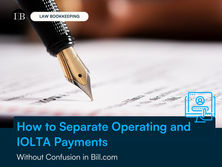top of page
Our Blog
Blog
Search


How to Manage Client Refunds and Unearned Fees in IOLTA
Handling client funds is a core duty for every law firm. When refunds or unearned fees are involved, the risk is higher. The Interest on Lawyers’ Trust Accounts (IOLTA) program protects client money and supports legal aid. It also sets strict rules for how firms must hold, earn, and return funds. This guide explains key terms, gives you a step-by-step SOP, and lists common mistakes to avoid. Follow it to stay compliant, protect your reputation, and maintain client trust. Beca
Nov 19, 20256 min read


The ROI of Outsourcing IOLTA & Operating Bookkeeping for Law Firms
IOLTA bookkeeping manages client trust accounts with strict rules to protect client funds, while operating bookkeeping handles a law firm’s own finances like payroll and expenses. Many law firms struggle with internal bookkeeping due to its complexity, risk of errors, and limited in-house expertise. Outsourcing bookkeeping offers a high ROI by ensuring compliance, improving accuracy, and freeing attorneys to focus on legal work and clients. What Is IOLTA Bookkeeping? Definiti
Nov 18, 20255 min read


IOLTA Disbursements: Why Solo Paralegal Oversight Fails (and What to Do Instead)
Handling IOLTA disbursements demands ethical judgment, precise record-keeping, and strict internal controls. Paralegals are essential, but giving them sole authority over trust-account payouts increases the risk of misallocation, commingling, and reconciliation gaps, issues that can erode client trust and trigger bar discipline. The safer model is a team workflow: segregation of duties, monthly three-way reconciliation , dual authorization, and oversight by a qualified bookk
Nov 18, 20255 min read


How to Separate Operating and IOLTA Payments Without Confusion in Bill
Law firms manage two very different money streams: Operating funds and IOLTA (Interest on Lawyers’ Trust Accounts) . These funds must never be mixed —yet many firms find it hard to keep them separate when using payment platforms like Bill.com . Bill.com streamlines payables, but without the right setup it can blur the line between operating and trust accounts. This guide explains why that happens and how to configure Bill.com so the separation stays clear, compliant , and
Nov 17, 20254 min read


How Outsourced Bookkeeping Firms Support Law Firms’ IOLTA Disbursement Compliance
Handling client funds through Interest on Lawyers Trust Accounts (IOLTA) is a critical responsibility for law firms. The stakes are high, and the rules governing IOLTA accounts are complex and unforgiving. Mistakes can lead to severe penalties, damage to reputation, and even disciplinary action. This is where outsourced bookkeeping firms step in as invaluable partners, providing expertise and precision to ensure compliance with IOLTA disbursement requirements. The High Stake
Nov 14, 20256 min read


Best Practices for Syncing Bill.com with QuickBooks for Trust Accounting
Trust accounting demands precision, transparency, and strict compliance with legal regulations. Law firms and fiduciaries often juggle multiple client funds, each requiring separate tracking and reporting. Integrating Bill.com with QuickBooks offers a powerful solution to streamline this complex process, but it requires careful setup and ongoing management to avoid costly errors. When syncing Bill.com with QuickBooks for trust accounting, the goal is to ensure accurate, rea
Nov 13, 20254 min read


IOLTA Compliance Checklist: What Every Law Firm Must Review Monthly
Managing an Interest on Lawyers Trust Account (IOLTA) is more than just a regulatory requirement-it’s a cornerstone of ethical law practice. Every month, law firms must meticulously review their IOLTA accounts to ensure compliance, protect client funds, and avoid costly penalties. But what exactly should be on that monthly checklist? Understanding the nuances between key accounting terms like disbursements and checks is critical. This article breaks down the essentials every
Nov 12, 20257 min read


How to Set Up Vendor Profiles for Court Fees, Experts, and Clients in Bill.com
Key Takeaways: Set up complete vendor profiles in Bill.com including tax IDs, payment terms, and contact details. Categorize vendors (court fees, experts, clients) to simplify tracking. Use attachments and notes for compliance documentation. Integrate Bill.com with QuickBooks or Xero for consistency. Regularly audit vendor data for accuracy and fraud prevention. Managing payments in a law firm involves juggling multiple vendors-from court fee offices to expert witnesses and
Nov 3, 20255 min read


Step-by-Step: How Bookkeepers Handle IOLTA Payments Using Bill.com
Streamlining Trust Account Payments the Smart Way The Challenge of Managing IOLTA Payments Manually Managing Interest on Lawyers’ Trust Accounts (IOLTA) manually can lead to compliance risks, duplicate payments, and reconciliation headaches. Law firms must adhere to strict regulations, but tracking payments through spreadsheets and paper checks increases the risk of errors and missed deadlines. As transaction volume grows, maintaining accuracy becomes nearly impossible witho
Oct 30, 20255 min read


Why More Law Firms Are Using Bill.com to Manage IOLTA Disbursements
Managing IOLTA (Interest on Lawyers Trust Accounts) disbursements is one of the most sensitive tasks for law firms. These accounts hold client funds that must be tracked, disbursed, and reported with complete accuracy to meet state bar regulations. Traditional manual methods, spreadsheets, paper checks, and email approvals, often lead to errors, delays, and compliance risks. To solve this, many law firms now use Bill.com , an automated accounting platform that streamlines IO
Oct 28, 20256 min read


Common IOLTA Disbursement Mistakes That Can Trigger Compliance Issues
Handling client funds through an Interest on Lawyers Trust Account (IOLTA) demands meticulous attention to detail. Any misstep in disbursement processes can lead to serious compliance problems, potentially resulting in disciplinary action or damage to a law firm’s reputation. Understanding the typical pitfalls in IOLTA disbursements is crucial for maintaining ethical standards and avoiding costly errors. Why Accuracy Matters in IOLTA Disbursements An IOLTA (Interest on Lawy
Oct 27, 20255 min read


The Difference Between a Disbursement and a Check in IOLTA Accounting
In IOLTA accounting , a disbursement refers to the purpose of a payment, funds paid on behalf of a client, while a check is simply the instrument used to make that payment. Understanding this distinction helps law firms maintain compliant, transparent, and audit-ready trust account records. Why the Distinction Matters At first glance, a check may seem like a simple payment method and a disbursement just an expense. In IOLTA accounting , however, these terms have specific mean
Oct 24, 20255 min read
bottom of page
